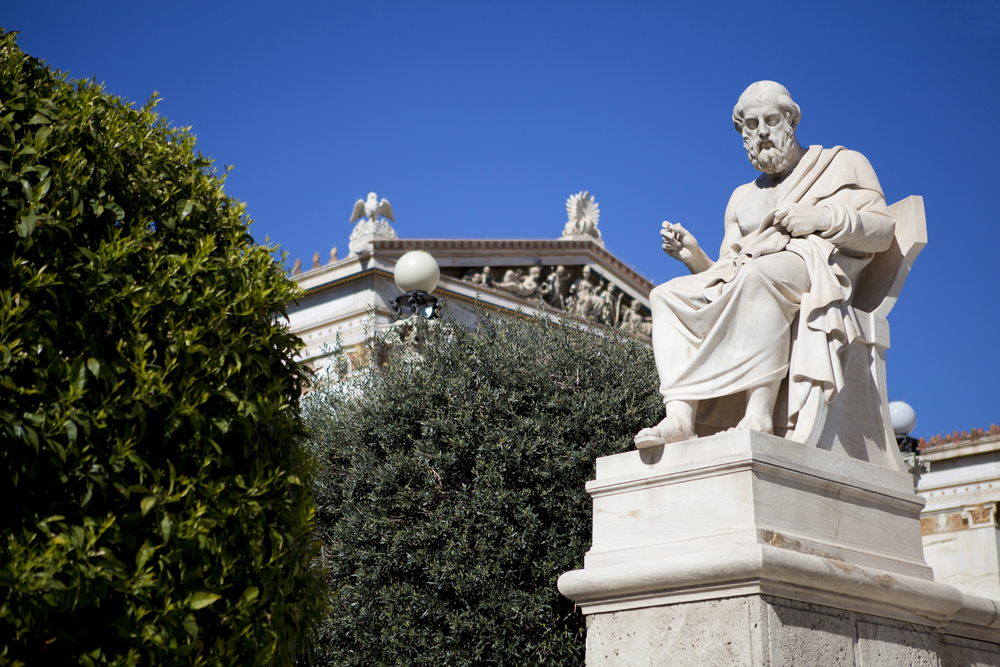When we consider the origin of the fundamental principles of economics, most of us think of Adam Smith and his Wealth of Nations. Smith arguably pioneered economics as its own discipline with this groundbreaking articulation of the workings of the free market. He should certainly be given his due for the breadth and depth of his comprehensive contribution.
Smith, however, was far from the first to comment on the basic human tendencies that formed the backbone of commerce and trade for millennia before him. While they may not have comprised a unified field of study, economic language, tools, and principles were woven into philosophical, political, and legal discussions in many well-known historical texts. One of these is Plato’s Republic, written around 375 B.C. and commonly acclaimed as his masterwork.
As much as we revere him, Plato might not be the first person we think of when trying to understand the principles of the free market. After all, we know him as a philosopher, not an economist. In Book II of his Republic, however, we find some surprisingly clear and helpful expressions of several basic economic principles. It’s encouraging to see such a prominent ancient thinker already assuming basic tenets of exchange and economic behavior; it serves to reinforce the idea that this kind of activity is natural to humans living in society. Plato’s articulations are also remarkably simple and succinct, providing accessible images of the fundamental principles of free exchange in action.
Here I will lay out four foundational economic principles we can see in just a few pages of Plato’s dialogue—the portion where he seeks to construct an ideal society. These passages serve as food for reflection on elements of our current economy that we might take for granted, providing ancient insight on a timeless topic.
#1 — Self-Interest
I think a city comes to be because none of us is self-sufficient, but we all need many things … and because one person calls on a second one out of one need and on a third out of a different need, many people gather in a single place to live together as partners and helpers. (369b, c)
Here Plato begins his construction of an ideal city in order to observe what justice in a perfect city would look like. He begins by pointing out that it is need that first drives individuals to associate with one another. No one is self-sufficient, says Plato, and because we all have many needs we can’t satisfy by ourselves, we band together to help meet each other’s needs.
It’s worth pointing out that the emphasis for forming a society is on the individual’s self-interest, not on his beneficence toward others or his desire for companionship. While man may be a social animal by nature (something Aristotle will point out a bit later), Plato does not assert this as the reason he chooses to live in community. Rather, it is because he is interested in self-preservation; he wants his needs met, so he lives close to other people who can meet them.
According to Plato, self-interest is the most natural motivation for the formation of a city, which then becomes the locus of exchange by allowing men to live “as partners and helpers” of one another. Thousands of years later, self-interest is still highlighted by economists as the fundamental engine of the free market.
#2 — Subjective Value
And if they share things with one another, giving and taking, they do so because each believes that this is better for himself. (369c)
With these few words, Plato puts his finger directly on the economic concept of subjective value, which describes the phenomenon that drives all exchange—the fact that the value I perceive in the goods you give me is greater than the value I perceive in the goods I give you in exchange for it. This clearly builds off the principle of self-interest because if I didn’t think I would benefit, i.e., gain increased value, through a trade with you, I wouldn’t choose to make the trade (in a free market). I wouldn’t trade you my copy of Phenomenology of Spirit for your copy of Being and Time if I thought Heidegger’s philosophy was worthless compared to Hegel’s. (I don’t, by the way.)
It might seem obvious how the notion of subjective value comes into play in the arena of exchange, but its importance should not be overlooked. The upshot of each partner’s believing that “this is better for himself” is that economic exchange is a positive-sum game—both parties benefit, in a free market, by receiving something that has greater value to them than what they gave away. This helps the free market resists the zero-sum critique—that whenever one person gains in the marketplace, another person loses. With the notion of subjective value, that simply isn’t so. Even Plato knew it.
#3 — Comparative Advantage
We aren’t all born alike, but each of us differs somewhat in nature from the others, one being suited to one task, another to another. …The result, then, is that more plentiful and better-quality goods are more easily produced if each person does one thing for which he is naturally suited, does it at the right time, and is released from having to do any of the others. (370b, c)
Consonant with the principles of self-interest and subjective value is that of comparative advantage. If we’re interested in exchange with others to meet the needs we can’t satisfy on our own, and we want to offer them something they’ll value more than what they’re offering us (so that they choose to make the trade), shouldn’t we each focus on producing what we’re best at making? That way, since goods, labor, and time are scarce, we’re each making the best use of available resources according to our particular skillset in terms of the quality and quantity of goods produced. This increases the value in exchange for everyone.
Plato uses the example of a farmer to illustrate this intuitive principle. He thinks that if the farmer focuses on growing food full-time rather than spending part of his time growing food, part building a house, and part making clothes and shoes, he will get the most value out of his labor and time investment, since he’s doing what he’s best suited for. Similarly, the builder, the weaver, and the cobbler will get the most value out of their time investments as well. The idea is that if each individual uses his comparative advantage this way, by specializing in a certain area, it actually benefits not only that individual but also the entire community engaged in commerce.
A point of interest: later on in the Republic, Plato sets the principle of comparative advantage (“each doing his own work”) as the definition of justice in the ideal city he constructs. He uses it as an image to represent the desired harmony of each part of the soul caring for its own affairs, a harmony he ultimately labels as justice. Interestingly, though, one of his conclusions is that the ruler of the ideal city must be both a king and a philosopher, which sounds like two functions, both of which it would be difficult to perform well. So it’s unclear how far Plato would advise we take this single-minded approach to choice of profession. Certainly, overspecialization can be a pitfall of comparative advantage, leading to excessive division of labor, dehumanization, and a lack of flourishing in extreme cases (think a monotonous assembly line job). Nevertheless, comparative advantage remains a fundamental principle of value creation when employed in moderation within a healthy economy.
#4 — Entrepreneurship
There’ll be people who’ll notice this [inefficiency] and provide the requisite service … they’ll stay around the market exchanging money for the goods of those who have something to sell and then exchanging those goods for the money of those who want them. (371c-d)
In this passage, Plato seems to be describing what we know as entrepreneurship. Those he calls “retailers” have the distinguishing character of entrepreneurs—they notice a need in the market before anyone else does and take the initiative to fill it. In this case, the “retailers” have observed that the craftsman’s time is more efficiently employed in plying his craft than in sitting around a marketplace to sell his products, so the retailer (who, Plato says, is usually someone who isn’t “fit to do any other work”) takes over, offering to sell the craftsman’s goods for him in exchange for a cut of the proceeds. The craftsman benefits because his time is employed in the activity that is most profitable for him, and the retailer benefits through being compensated for the helpful service he provides.
Entrepreneurs choose to embrace the risk of new ventures because of self-interest and the perceived value gain that comes from capitalizing on a neglected market opportunity. But as has been pointed out, in doing so they create value for everyone. The profit that entrepreneurs receive is the measure of the value they have created for others.
Plato and the Free Market
The fact that these four basic economic principles show up in rapid succession in the Republic, and notably in the part where Plato is just beginning to construct his ideal city, seems to imply that he saw them as describing fundamental human behaviors that naturally occur even in a rudimentary society. If even the ancients observed that this is the way human beings naturally interact with one another when forming a free society and that the conjunction of these principles provides universal benefit, then, given that human nature has not fundamentally changed, this seems to be good evidence that these same principles, which free-market economists tout today, remain valid.
This is not to say that Plato had no critiques of the market. Shortly after expressing these basic economic ideas, he describes the corruption that can be introduced into a market through the creation of false demand for luxuries and extravagances that meet intemperate desires rather than real human needs, a controversial issue touching both economics and moral philosophy. Additionally, it could be argued, based on other passages in the Republic, that Plato denies other important principles of the free market, such as private property (see 464a-c).
It should be remembered that most of the Republic is a giant thought experiment as to what would constitute the ideal, just society, and that the maximally just city Plato constructs with words is itself meant to be a model for the just human soul. Thus, it is highly contested as to which parts of the dialogue, if any, Plato meant to be taken literally. Certainly, this critique could apply not only to his socialist idea of keeping goods (as well as wives and children) in common but also to the free market principes he articulates in Book II.
Nevertheless, the fact that the notions of self-interest, subjective value, comparative advantage, and entrepreneurship are accepted without question by Plato’s dialogue partners, whereas, for example, his idea of property and children being held in common requires extensive explanation, lends support to their standing as fundamental facts about human nature. In addition, Plato’s ruminations on how basic drives like self-preservation interact with the virtuous and vicious desires of the human soul confront exactly the sorts of questions we ought to be considering today as we deal with the complexities of the modern global market. It’s worth returning to ancient wisdom to spark reflection on these weighty topics.

